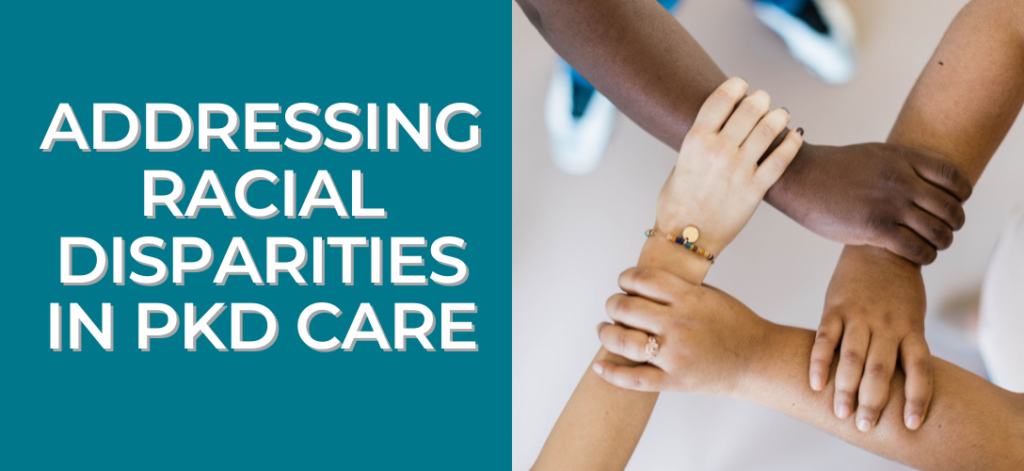
Published on May 11, 2021 | Among health experts, a consensus has developed that recognizes how implicit racial bias and social determinants affect all aspects of American health care. This includes a better awareness of how the circumstances in which people are born, live, and work affect health outcomes in the U.S. This is especially prevalent in the treatment of chronic kidney disease, including polycystic kidney disease. While PKD is an equal opportunity disease, gaps in care and coverage of necessary treatments continue to lag for underserved communities in America, especially Black and Hispanic/Latino populations. So how do we address racial disparities in PKD care? Through policy and advocacy.
According to the Kaiser Family Foundation, Hispanic/Latino and Black Americans are insured at lower rates than other American ethnic groups, and researchers have identified racial differences in age at kidney failure and rates of mortality among older patients with autosomal dominant polycystic kidney disease (ADPKD).
The PKD Foundation named addressing these racial disparities in kidney care as one of our top advocacy priorities for this Congress. We support several policies in health equity. We’re advocating approaches to bridge these gaps in care, coverage, awareness, and early intervention of PKD.
Improving PKD Education and Surveillance in Underserved Communities
To address gaps in care and coverage, the Foundation supports increased public investment in kidney health equity. Every year, we work to secure consistent federal funding for kidney disease research and surveillance. This year, we’re asking Congress to expand grant funding mechanisms for reducing health disparities and social determinants that affect chronic, inherited kidney disease care. These funds would be used by researchers and community organizations to fund innovative work at both a societal and targeted level, helping to alleviate disease burden in disproportionally impacted communities.
Another strategy to increasing equity in care is expanding screening programs for CKD. Consistent, accessible screenings targeted to populations disproportionately at-risk for developing CKD allows patients to identify the disease at an earlier stage and kickstart the development of a treatment plan. This takes into consideration each patient’s social determinants of health. Studies show that earlier diagnoses and consistent care from providers will promote awareness, surveillance, and early intervention among patients with a family history of PKD.
Tackling Racial Inequities in PKD Care: Access to Living Kidney Donations
Lastly, there is a great need to close the race and ethnicity gap in access to kidney transplants from living donors. Survey results from the Clinical Journal of the American Society of Nephrology show large gaps in rates of kidney donation for Black patients. This is especially true among living organ donations, which face increased hesitation among many in the Black community.
According to the survey, these gaps in donation can be bridged with culturally competent education in communities of color to encourage living organ donation as an accessible and safe treatment option. It’s imperative to strengthen insurance coverage protections and allowed time off from work for those who so generously choose to donate to someone in need.
There are several bills and proposals on this topic being debated in this Congress, each varying in approach and scope. The Foundation is working behind the scenes with the broader kidney advocacy community, ensuring that the needs of PKD and inherited kidney diseases are addressed in legislation advanced in Congress. Supporting legislation with provisions directly targeting health inequities in PKD and other forms of inherited chronic kidney disease is part of our mission to fund research, advocate for patients, and build a community for all impacted by PKD.
Interested in PKD advocacy? Sign up for PKD Foundation advocacy alerts!









Have you thought about hosting a roundtable discussion around racial disparities in healthcare among PKD patients from the black and Brown communities?
Yes, we’ll be hosting a roundtable about this topic at the 2022 PKD Connect Conference. Please keep an eye on pkdcure.org/conference for more information in January.